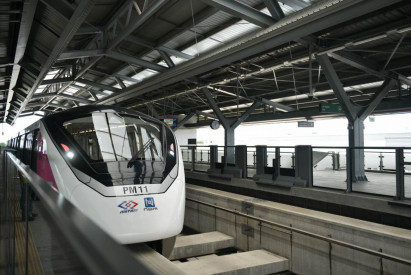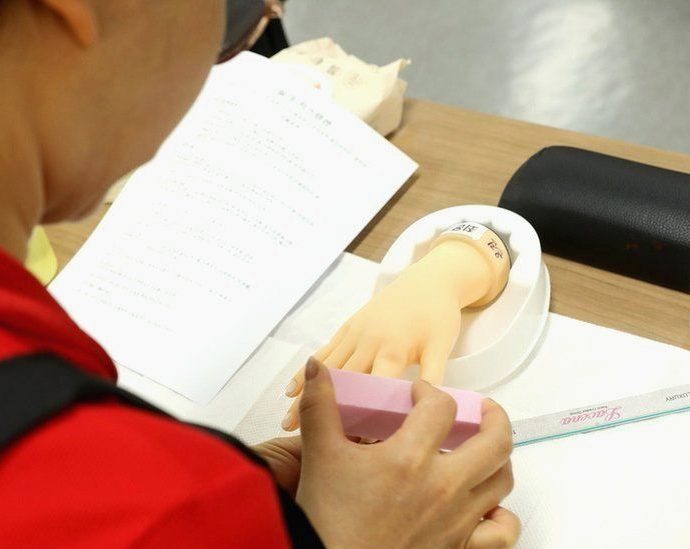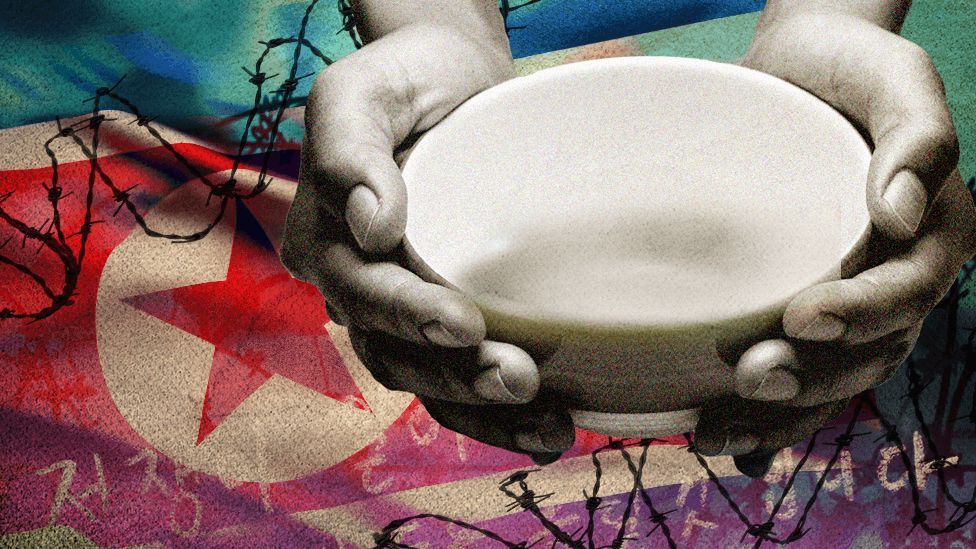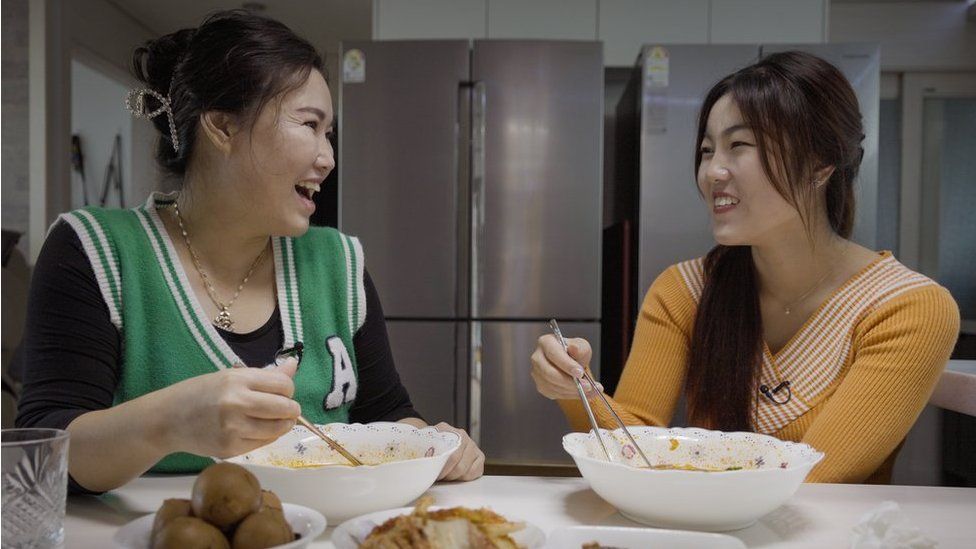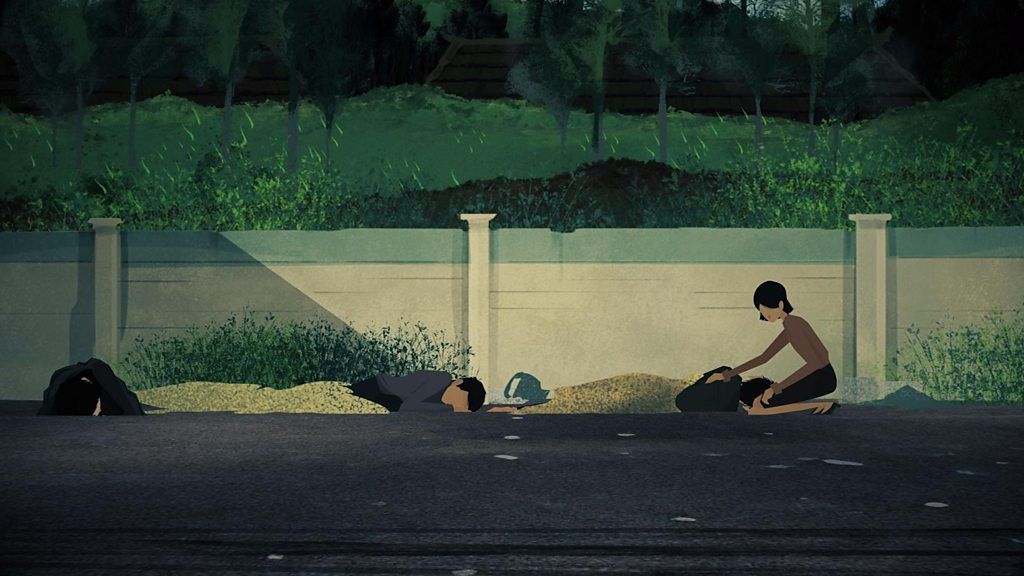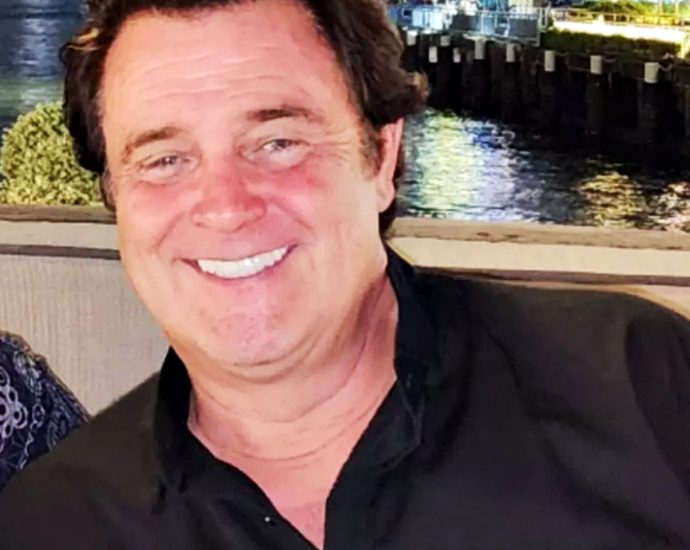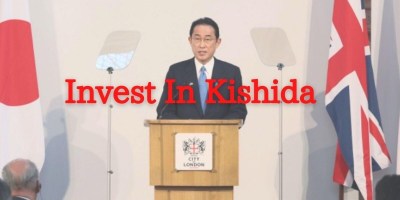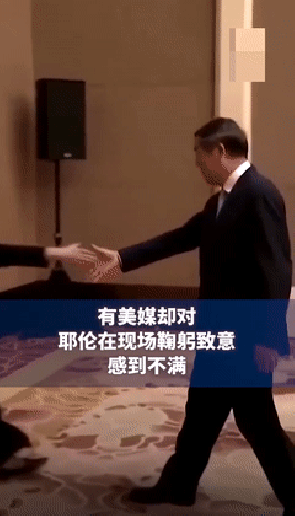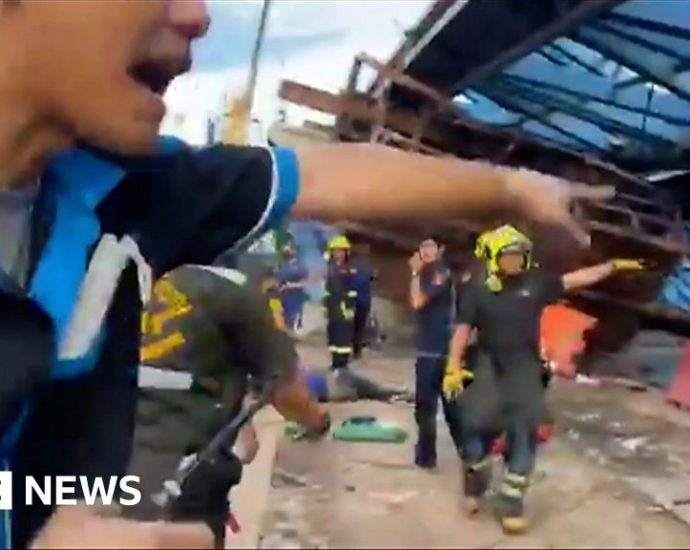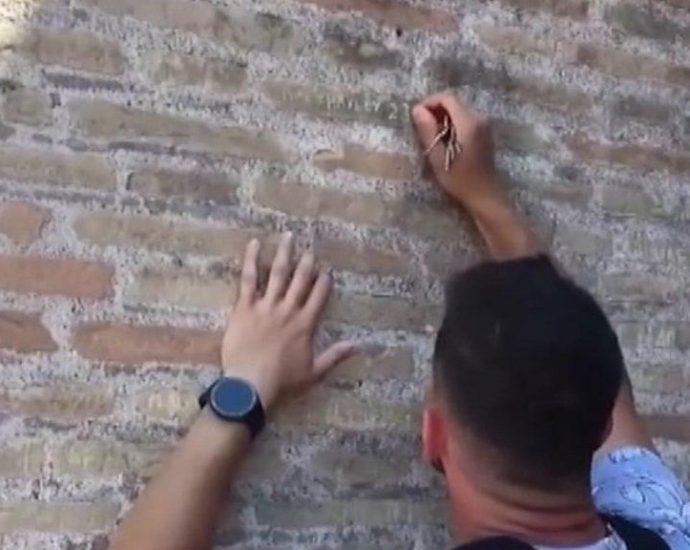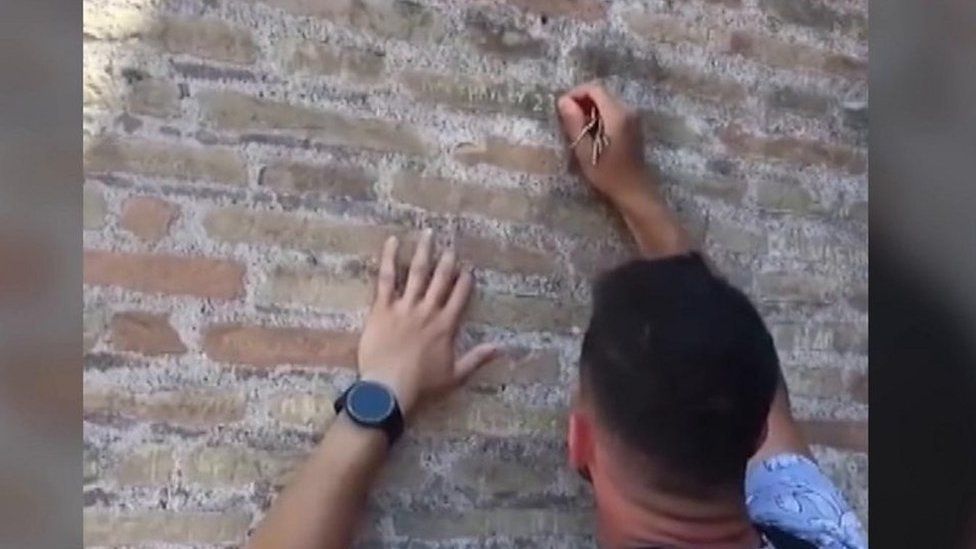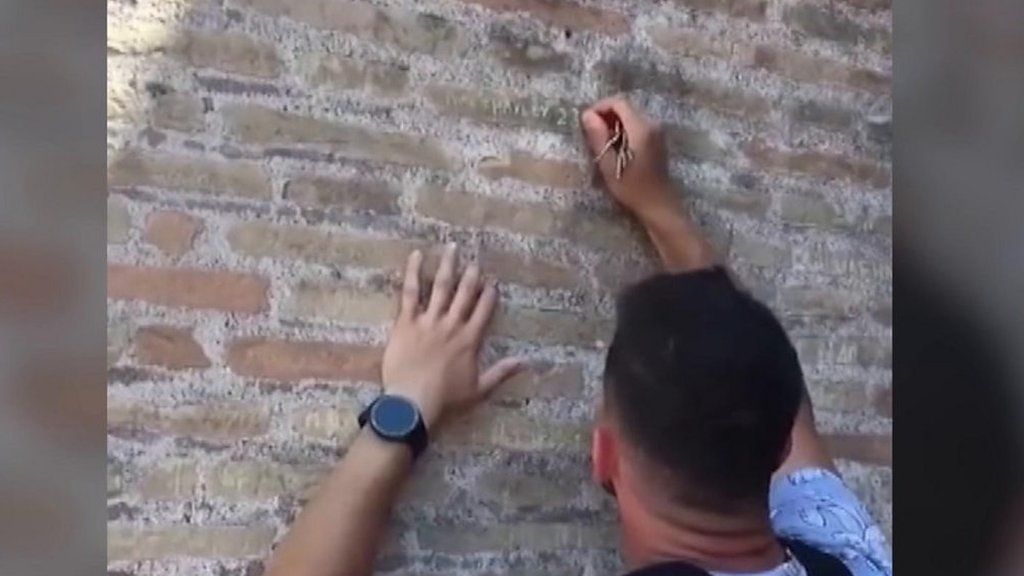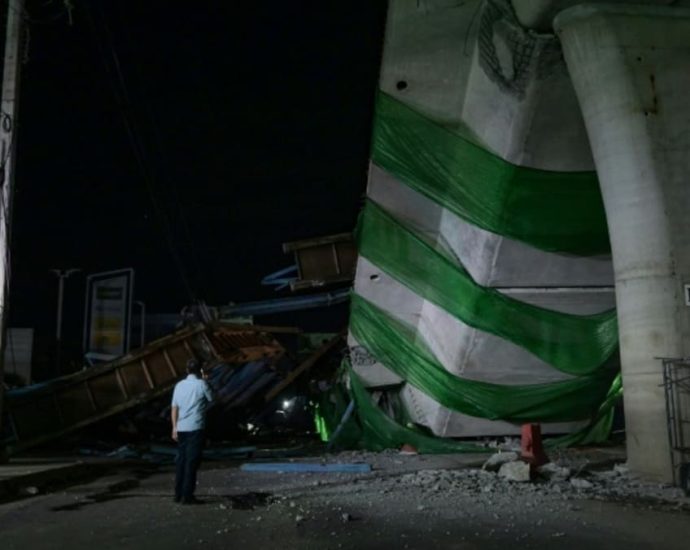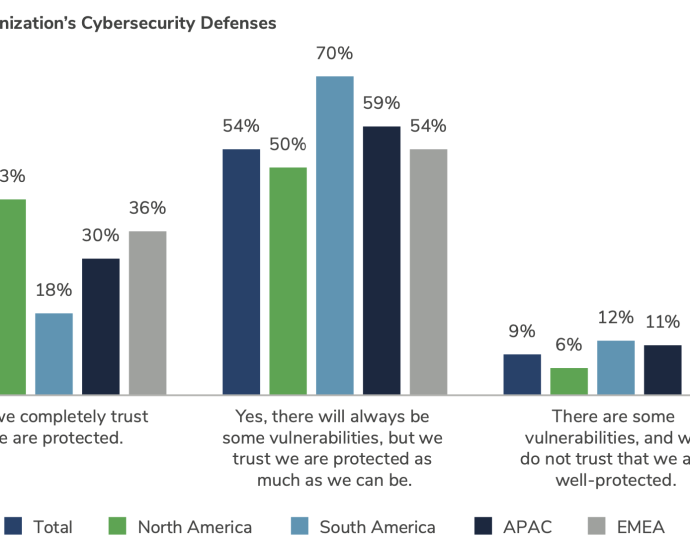PM checks progress on Pink Line

Prime Minister Prayut Chan-o-cha on Monday inspected progress on the Pink Line, an elevated monorail system under construction, prior to starting a trial run at the end of the year.
Gen Prayut, accompanied by Interior Minister Anupong Paojinda, boarded a train on a test run between Min Buri and Lat Pla Khao stations on Monday. During the ride, the premier received a briefing about construction progress from Pakapong Sirikantaramas, governor of the Mass Rapid Transit Authority of Thailand (MRTA).
The Pink Line is one of several electric train lines and sections initiated by the Prayut government. The others are; the Purple Line covering 23km; the 18.7km Green Line from Mor Chit to Kukot; the 14km Blue Line (Hua Lamphong-Bang Kae section); the 13km Blue Line (Bang Sue-Tha Phra section); the 1.8km Gold Line from Krung Thon Buri to Klong San; the 26.3km Red Line (Bang Sue-Rangit section); the 15.2km Red Line (Bang Sue-Taling Chan section); and the 30.4km Yellow Line from Lat Phrao to Samrong. Altogether they cover a total of 142km.
The Pink Line links Lat Phrao in northern Bangkok with Samrong in the city’s east. It runs along the middle of Ram Intra Road, then heads to Chaeng Watthana before terminating at the Khae Rai junction.
The Pink Line will use the same monorail train model as the Yellow Line that is now in operation, with four to seven passenger carriages capable of carrying up to 28,000 passengers per hour.
There are 30 stations and two extended stations, along the 34km Pink Line, from Khae Rai Station to Muang Thong Thani. They include interchange stations for transfers to and from the Purple Line, the BTS’s Green Line, and the future Orange Line.
From trauma to training – new lives for North Koreaâs defectors
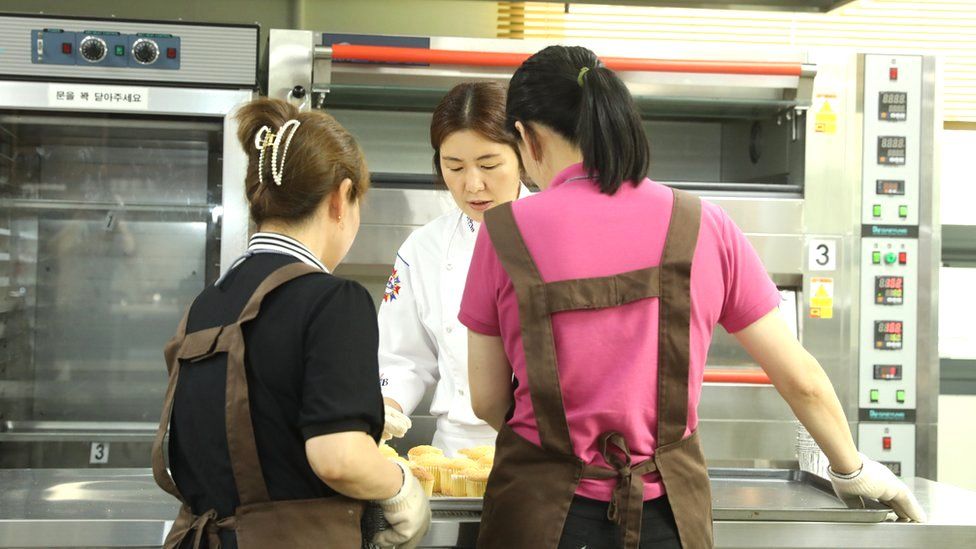 Unification Ministry
Unification MinistryAbout two hours’ drive from the South Korean capital, Seoul, in a rural setting of wooded hills and rice paddies, is a complex of buildings that look out of place.
Towering over the surrounding countryside, these multi-storey structures are surrounded by a high fence and guarded gate. The compound is isolated, secure and private.
Part training-hub, part medical facility, part re-education centre, this is where North Korean defectors are sent for three months when they arrive in South Korea.
Its name is Hanawon, or to give it its full title, the Settlement Support Centre for North Korean Refugees.
The number of North Koreans making the difficult and dangerous journey to South Korea – risking possible death if they are caught – to escape poverty and repression has fallen significantly in recent years.
A decade or so ago, nearly 3,000 arrived each year. That figure dropped to around 1,000 in the years that followed and then to below 100 during the pandemic, when North Korea sealed its borders.
Despite that, South Korea has reaffirmed its commitment not just to keeping Hanawon open, but to expanding its facilities.
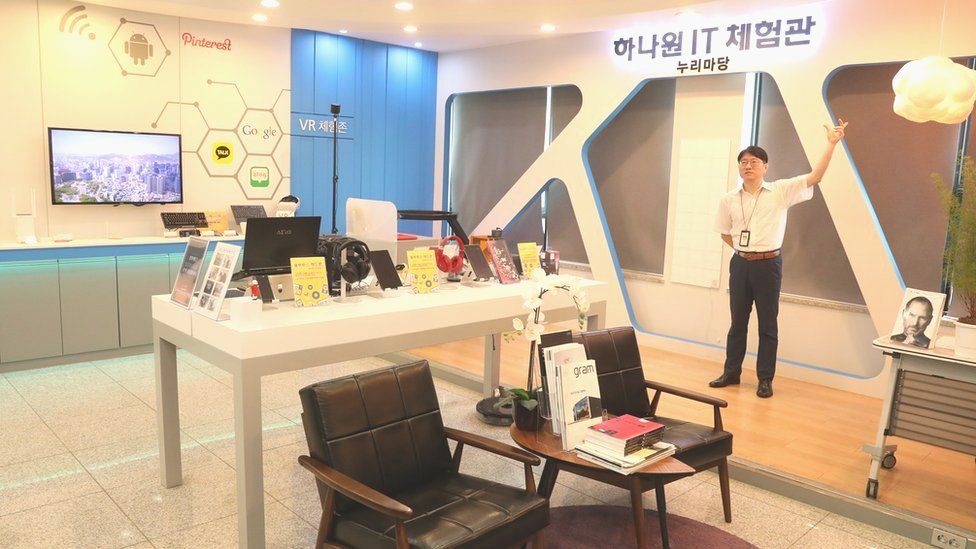
The government in Seoul believes that as Covid controls are relaxed in North Korea, more of its people will be able to flee. If that happens, Hanawon will again fill up.
Unification Minister Kwon Young-se said South Korea needs to prepare to greet these new arrivals.
“We need to think of defectors not as aliens, but as neighbours whose hometown is in the North,” he said.
With its hedges, flowers and manicured trees, Hanawon appeared welcoming in the summer sun on Monday, when the South Korean government gave journalists a rare glimpse inside the facility.
We were shown around a training centre, where North Korea defectors are offered 22 courses, in subjects such as hair and beauty, baking and clothes making.
One room has been made to look like a nail parlour, where defectors learn the delicate art of the manicure. They use model hands to practice painting, polishing and filing.
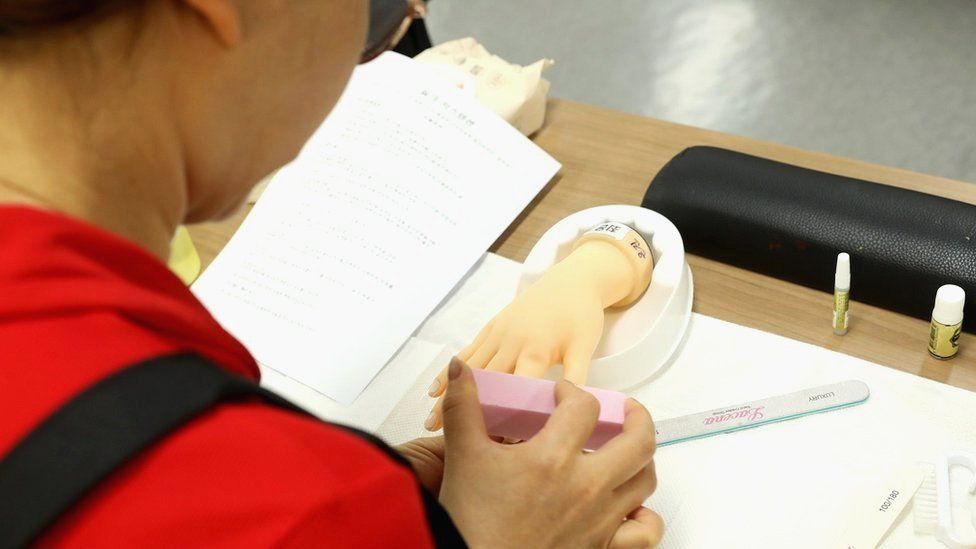
The delicious smell of baking fills the air; it has drifted down from a cookery class next-door.
Other courses are aimed at helping the North Koreans adjust to life in a country that is, in terms of technology, decades ahead of where they came from.
One classroom is set up like a shop selling high-tech gadgets. Tablets, smartphones and computers have been put on display.
While the floor of another building looks like a modern hospital. There is a small ward, consulting rooms and doctors walking around in white medical coats.
It is not just the physical needs of the North Koreans that are catered for; many arrive with severe psychological problems that need urgent attention.
.sc-bdVaJa {} .rPqeC{overflow:hidden;display:-webkit-box;display:-webkit-flex;display:-ms-flexbox;display:flex;background-color:#F2EFEC;-webkit-flex-direction:row;-ms-flex-direction:row;flex-direction:row;-webkit-flex-wrap:wrap;-ms-flex-wrap:wrap;flex-wrap:wrap;box-sizing:border-box;}
/* sc-component-id: sc-bwzfXH */
.sc-bwzfXH {} .eynLQr{width:100%;height:100%;object-fit:cover;object-position:50% 50%;position:absolute;background-size:cover;background-position-x:50%;background-position-y:50%;background-image:url(‘https://c.files.bbci.co.uk/assets/4978774e-5fe4-41e6-8db3-cede9bd9c5a6’);}
/* sc-component-id: sc-htpNat */
.sc-htpNat {} .kUePcj{max-width:743px;width:45%;position:relative;min-height:200px;-webkit-flex:1 1 auto;-ms-flex:1 1 auto;flex:1 1 auto;}
/* sc-component-id: sc-bxivhb */
.sc-bxivhb {} .huvKBR{max-width:100%;position:absolute;bottom:0;right:0;color:#ffffff;background:#000000;opacity:0.7;font-family:Helvetica,Arial,sans-serif;padding:5px;word-wrap:break-word;} @media (max-width:599px){.huvKBR{font-size:12px;line-height:16px;}} @media (min-width:600px) and (max-width:1007px){.huvKBR{font-size:13px;line-height:16px;}} @media (min-width:1008px){.huvKBR{font-size:12px;line-height:16px;}}
/* sc-component-id: sc-gzVnrw */
.sc-gzVnrw {} .blLFIH{width:45% !important;position:relative;margin:0;word-wrap:break-word;color:#404040;font-weight:300;-webkit-flex:1 0 auto;-ms-flex:1 0 auto;flex:1 0 auto;padding:16px;}
/* sc-component-id: sc-htoDjs */
.sc-htoDjs {} .kGbKV{display:block;}
/* sc-component-id: sc-dnqmqq */
.sc-dnqmqq {} .dHUwnI{font-weight:100;font-family:Helvetica,Arial,sans-serif;padding:11px 0 25px 0;} .dHUwnI p{margin:0;} @media (max-width:599px){.dHUwnI{font-size:18px;line-height:22px;}} @media (min-width:600px) and (max-width:1007px){.dHUwnI{font-size:21px;line-height:24px;}} @media (min-width:1008px){.dHUwnI{font-size:20px;line-height:24px;}}
/* sc-component-id: sc-iwsKbI */
.sc-iwsKbI {} .jiPRqw{display:block;}
/* sc-component-id: sc-gZMcBi */
.sc-gZMcBi {} .honXkL{padding-top:10px;font-family:Helvetica,Arial,sans-serif;}
/* sc-component-id: sc-gqjmRU */
.sc-gqjmRU {} .klLnaG{color:#404040;font-style:normal;font-family:Helvetica,Arial,sans-serif;} .klLnaG > strong{font-weight:bold;} @media (max-width:599px){.klLnaG{font-size:16px;line-height:20px;}} @media (min-width:600px) and (max-width:1007px){.klLnaG{font-size:18px;line-height:22px;}} @media (min-width:1008px){.klLnaG{font-size:16px;line-height:20px;}} @font-face { font-family: ‘ReithSans’; font-display: swap; src: url(https://c.files.bbci.co.uk/graphics/static/media/BBCReithSans_W_Rg.woff2) format(“woff2”); } @font-face { font-family: ‘ReithSans’; font-display: swap; src: url(https://c.files.bbci.co.uk/graphics/static/media/BBCReithSans_W_Bd.woff2) format(“woff2”); font-weight: bold; } @font-face { font-family: ‘BBCNassim’; font-display: swap; src: url(https://c.files.bbci.co.uk/graphics/static/media/BBC-Nassim-Regular-1-55-URD-Desktop.ttf) format(“truetype”); } @font-face { font-family: ‘BBCNassim’; font-display: swap; src: url(https://c.files.bbci.co.uk/graphics/static/media/BBC-Nassim-Bold-1-55-URD-Desktop.ttf) format(“truetype”); font-weight: bold; } @font-face { font-family: ‘Iskoola_pota_bbc’; font-display: swap; src: url(https://c.files.bbci.co.uk/graphics/static/media/iskpotaRegular.ttf) format(“truetype”); } @font-face { font-family: ‘Iskoola_pota_bbc’; font-display: swap; src: url(https://c.files.bbci.co.uk/graphics/static/media/iskpotaBold.ttf) format(“truetype”); font-weight: bold; } @font-face { font-family: ‘Latha’; font-display: swap; src: url(https://c.files.bbci.co.uk/graphics/static/media/lathaRegular.ttf) format(“truetype”); } @font-face { font-family: ‘Latha’; font-display: swap; src: url(https://c.files.bbci.co.uk/graphics/static/media/lathaBold.ttf) format(“truetype”); font-weight: bold; } @font-face { font-family: ‘Mangal’; font-display: swap; src: url(https://c.files.bbci.co.uk/graphics/static/media/mangalRegular.ttf) format(“truetype”); } @font-face { font-family: ‘Mangal’; font-display: swap; src: url(https://c.files.bbci.co.uk/graphics/static/media/mangalBold.ttf) format(“truetype”); font-weight: bold; } @font-face { font-family: ‘Noto Sans CJK KR’; font-display: swap; src: url(https://c.files.bbci.co.uk/graphics/static/media/NotoSansCJKkr-Regular.otf) format(“opentype”); } @font-face { font-family: ‘Noto Sans CJK KR’; font-display: swap; src: url(https://c.files.bbci.co.uk/graphics/static/media/NotoSansCJKkr-Bold.otf) format(“opentype”); font-weight: bold; } @font-face { font-family: ‘Noto Sans Gurmukhi’; font-display: swap; src: url(https://c.files.bbci.co.uk/graphics/static/media/NotoSansGurmukhi-Regular.ttf) format(“truetype”); } @font-face { font-family: ‘Noto Sans Gurmukhi’; font-display: swap; src: url(https://c.files.bbci.co.uk/graphics/static/media/NotoSansGurmukhi-Bold.ttf) format(“truetype”); font-weight: bold; } @font-face { font-family: ‘Padauk’; font-display: swap; src: url(https://c.files.bbci.co.uk/graphics/static/media/PadaukRegular.ttf) format(“truetype”); } @font-face { font-family: ‘Padauk’; font-display: swap; src: url(https://c.files.bbci.co.uk/graphics/static/media/PadaukBold.ttf) format(“truetype”); font-weight: bold; } @font-face { font-family: ‘Shonar_bangala’; font-display: swap; src: url(https://c.files.bbci.co.uk/graphics/static/media/ShonarRegular.ttf) format(“truetype”); } @font-face { font-family: ‘Shonar_bangala’; font-display: swap; src: url(https://c.files.bbci.co.uk/graphics/static/media/ShonarBold.ttf) format(“truetype”); font-weight: bold; } @font-face { font-family: ‘NotoSansEthiopic’; font-display: swap; src: url(https://c.files.bbci.co.uk/graphics/static/media/NotoSansEthiopic-Regular.ttf) format(“truetype”); } @font-face { font-family: ‘NotoSansEthiopic’; font-display: swap; src: url(https://c.files.bbci.co.uk/graphics/static/media/NotoSansEthiopic-Bold.ttf) format(“truetype”); font-weight: bold; } @font-face { font-family: ‘Mallanna’; font-display: swap; src: url(https://c.files.bbci.co.uk/graphics/static/media/mallanna.ttf) format(“truetype”); }
One of my patients… was worried about what people would think if they knew he was from the North
Dr Jeon Jin-yong is a psychiatrist who has worked at Hanawon. He has heard terrible tales of trauma from North Koreans who have passed through the facility.
He said they have had to cope with the stress of escape, and the constant fear that they will be caught and sent back before they make it to South Korea.
Many struggle to overcome the guilt of leaving relatives behind in North Korea who they might never see again.
Some face prejudice in South Korea and so choose to hide the fact that they are from the North.
“One of my patients was once having lunch in a restaurant when on the television there was news about North Korea launching a missile,” said Dr Jeon.
“He became very uncomfortable, so quickly finished eating and left the restaurant. He was worried about what people would think if they knew he was from the North.”
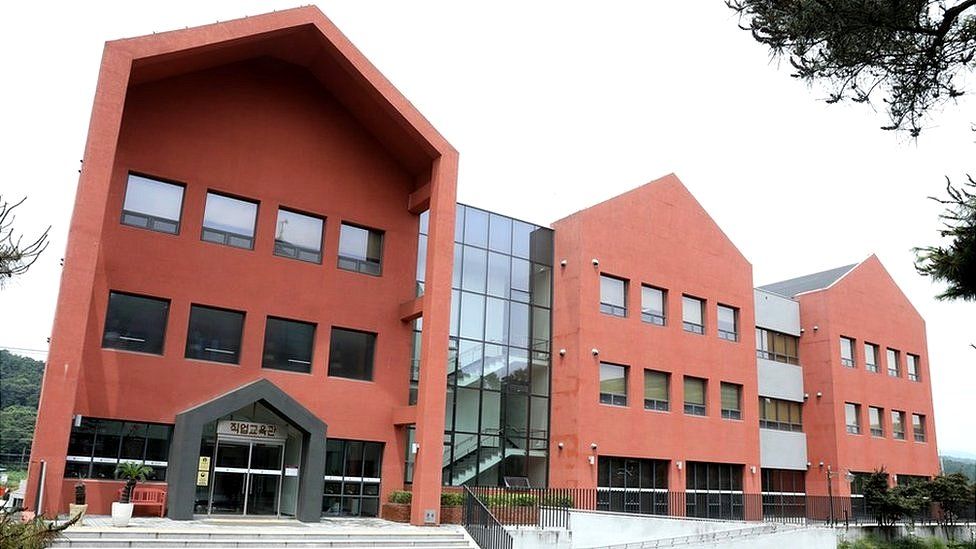
In an interview with journalists, three female defectors currently at Hanawon gave a hint of the difficulties they are trying to overcome.
They were fearful of revealing their names and were introduced as A, B and C. One woman spoke from behind a screen.
All three had arrived in South Korea after first escaping to China, where their lives were better than in North Korea – but still full of anxiety and danger.
Woman B said she was unable to get a Chinese identity card, which meant she could not go to a hospital, get a bank card or even travel on a train.
Woman C said she was paid half the wages of a Chinese worker because she was in no position to argue for more.
They also described a tightening net of Chinese surveillance that had forced them to seek shelter in South Korea.
“When I first decided to defect I wasn’t afraid of anything because I was all alone,” said woman A. “But then I had a child in China and realised I had no legal status.”
All three women spoke of their hopes – and trepidation – for the future. One of them said she was even worried about paying tax.
.sc-bdVaJa {} .hlroRb{overflow:hidden;display:-webkit-box;display:-webkit-flex;display:-ms-flexbox;display:flex;background-color:#F2EFEC;-webkit-flex-direction:row-reverse;-ms-flex-direction:row-reverse;flex-direction:row-reverse;-webkit-flex-wrap:wrap;-ms-flex-wrap:wrap;flex-wrap:wrap;box-sizing:border-box;}
/* sc-component-id: sc-bwzfXH */
.sc-bwzfXH {} .frfgHi{width:100%;height:100%;object-fit:cover;object-position:50% 50%;position:absolute;background-size:cover;background-position-x:50%;background-position-y:50%;background-image:url(‘https://c.files.bbci.co.uk/assets/3b3bc63c-130c-4d18-afd2-395aa11b577f’);}
/* sc-component-id: sc-htpNat */
.sc-htpNat {} .kUePcj{max-width:743px;width:45%;position:relative;min-height:200px;-webkit-flex:1 1 auto;-ms-flex:1 1 auto;flex:1 1 auto;}
/* sc-component-id: sc-bxivhb */
.sc-bxivhb {} .bQGZgI{max-width:100%;position:absolute;bottom:0;left:0;color:#ffffff;background:#000000;opacity:0.7;font-family:Helvetica,Arial,sans-serif;padding:5px;word-wrap:break-word;} @media (max-width:599px){.bQGZgI{font-size:12px;line-height:16px;}} @media (min-width:600px) and (max-width:1007px){.bQGZgI{font-size:13px;line-height:16px;}} @media (min-width:1008px){.bQGZgI{font-size:12px;line-height:16px;}}
/* sc-component-id: sc-gzVnrw */
.sc-gzVnrw {} .blLFIH{width:45% !important;position:relative;margin:0;word-wrap:break-word;color:#404040;font-weight:300;-webkit-flex:1 0 auto;-ms-flex:1 0 auto;flex:1 0 auto;padding:16px;}
/* sc-component-id: sc-htoDjs */
.sc-htoDjs {} .kGbKV{display:block;}
/* sc-component-id: sc-dnqmqq */
.sc-dnqmqq {} .dHUwnI{font-weight:100;font-family:Helvetica,Arial,sans-serif;padding:11px 0 25px 0;} .dHUwnI p{margin:0;} @media (max-width:599px){.dHUwnI{font-size:18px;line-height:22px;}} @media (min-width:600px) and (max-width:1007px){.dHUwnI{font-size:21px;line-height:24px;}} @media (min-width:1008px){.dHUwnI{font-size:20px;line-height:24px;}}
/* sc-component-id: sc-iwsKbI */
.sc-iwsKbI {} .jiPRqw{display:block;}
/* sc-component-id: sc-gZMcBi */
.sc-gZMcBi {} .honXkL{padding-top:10px;font-family:Helvetica,Arial,sans-serif;}
/* sc-component-id: sc-gqjmRU */
.sc-gqjmRU {} .klLnaG{color:#404040;font-style:normal;font-family:Helvetica,Arial,sans-serif;} .klLnaG > strong{font-weight:bold;} @media (max-width:599px){.klLnaG{font-size:16px;line-height:20px;}} @media (min-width:600px) and (max-width:1007px){.klLnaG{font-size:18px;line-height:22px;}} @media (min-width:1008px){.klLnaG{font-size:16px;line-height:20px;}} @font-face { font-family: ‘ReithSans’; font-display: swap; src: url(https://c.files.bbci.co.uk/graphics/static/media/BBCReithSans_W_Rg.woff2) format(“woff2”); } @font-face { font-family: ‘ReithSans’; font-display: swap; src: url(https://c.files.bbci.co.uk/graphics/static/media/BBCReithSans_W_Bd.woff2) format(“woff2”); font-weight: bold; } @font-face { font-family: ‘BBCNassim’; font-display: swap; src: url(https://c.files.bbci.co.uk/graphics/static/media/BBC-Nassim-Regular-1-55-URD-Desktop.ttf) format(“truetype”); } @font-face { font-family: ‘BBCNassim’; font-display: swap; src: url(https://c.files.bbci.co.uk/graphics/static/media/BBC-Nassim-Bold-1-55-URD-Desktop.ttf) format(“truetype”); font-weight: bold; } @font-face { font-family: ‘Iskoola_pota_bbc’; font-display: swap; src: url(https://c.files.bbci.co.uk/graphics/static/media/iskpotaRegular.ttf) format(“truetype”); } @font-face { font-family: ‘Iskoola_pota_bbc’; font-display: swap; src: url(https://c.files.bbci.co.uk/graphics/static/media/iskpotaBold.ttf) format(“truetype”); font-weight: bold; } @font-face { font-family: ‘Latha’; font-display: swap; src: url(https://c.files.bbci.co.uk/graphics/static/media/lathaRegular.ttf) format(“truetype”); } @font-face { font-family: ‘Latha’; font-display: swap; src: url(https://c.files.bbci.co.uk/graphics/static/media/lathaBold.ttf) format(“truetype”); font-weight: bold; } @font-face { font-family: ‘Mangal’; font-display: swap; src: url(https://c.files.bbci.co.uk/graphics/static/media/mangalRegular.ttf) format(“truetype”); } @font-face { font-family: ‘Mangal’; font-display: swap; src: url(https://c.files.bbci.co.uk/graphics/static/media/mangalBold.ttf) format(“truetype”); font-weight: bold; } @font-face { font-family: ‘Noto Sans CJK KR’; font-display: swap; src: url(https://c.files.bbci.co.uk/graphics/static/media/NotoSansCJKkr-Regular.otf) format(“opentype”); } @font-face { font-family: ‘Noto Sans CJK KR’; font-display: swap; src: url(https://c.files.bbci.co.uk/graphics/static/media/NotoSansCJKkr-Bold.otf) format(“opentype”); font-weight: bold; } @font-face { font-family: ‘Noto Sans Gurmukhi’; font-display: swap; src: url(https://c.files.bbci.co.uk/graphics/static/media/NotoSansGurmukhi-Regular.ttf) format(“truetype”); } @font-face { font-family: ‘Noto Sans Gurmukhi’; font-display: swap; src: url(https://c.files.bbci.co.uk/graphics/static/media/NotoSansGurmukhi-Bold.ttf) format(“truetype”); font-weight: bold; } @font-face { font-family: ‘Padauk’; font-display: swap; src: url(https://c.files.bbci.co.uk/graphics/static/media/PadaukRegular.ttf) format(“truetype”); } @font-face { font-family: ‘Padauk’; font-display: swap; src: url(https://c.files.bbci.co.uk/graphics/static/media/PadaukBold.ttf) format(“truetype”); font-weight: bold; } @font-face { font-family: ‘Shonar_bangala’; font-display: swap; src: url(https://c.files.bbci.co.uk/graphics/static/media/ShonarRegular.ttf) format(“truetype”); } @font-face { font-family: ‘Shonar_bangala’; font-display: swap; src: url(https://c.files.bbci.co.uk/graphics/static/media/ShonarBold.ttf) format(“truetype”); font-weight: bold; } @font-face { font-family: ‘NotoSansEthiopic’; font-display: swap; src: url(https://c.files.bbci.co.uk/graphics/static/media/NotoSansEthiopic-Regular.ttf) format(“truetype”); } @font-face { font-family: ‘NotoSansEthiopic’; font-display: swap; src: url(https://c.files.bbci.co.uk/graphics/static/media/NotoSansEthiopic-Bold.ttf) format(“truetype”); font-weight: bold; } @font-face { font-family: ‘Mallanna’; font-display: swap; src: url(https://c.files.bbci.co.uk/graphics/static/media/mallanna.ttf) format(“truetype”); }
I felt such relief that I was finally in South Korea. I hugged my daughter and started to cry
Someone who knows what they are going through is Kim Sung-hui, who graduated from Hanawon just over a decade ago and now runs her own business making a rice wine that’s popular in North Korea.
In North Korea, Mrs Kim had been told that the South Koreans would initially welcome her – and then she would be tortured and killed.
“It wasn’t until I graduated from Hanawon that I finally realised that I was safe,” she said.
Mrs Kim said the real education for those at Hanawon would begin only after leaving the facility.
“The first night on the outside is a memorable one for all defectors. I felt such relief that I was finally in South Korea. I hugged my daughter and started to cry – not because I was sad or lonely – but because we’d survived,” the 49-year-old said.
In those first few weeks on the outside, Mrs Kim remembers the kindness of South Korean volunteers who helped her adjust.
They were there to welcome her when she stepped into her new home, they showed her around the local shops and even paid for her first ride in a taxi. She still keeps in touch with some of them.
Those still at Hanawon will be hoping for similar success.
-
-
16 February 2021
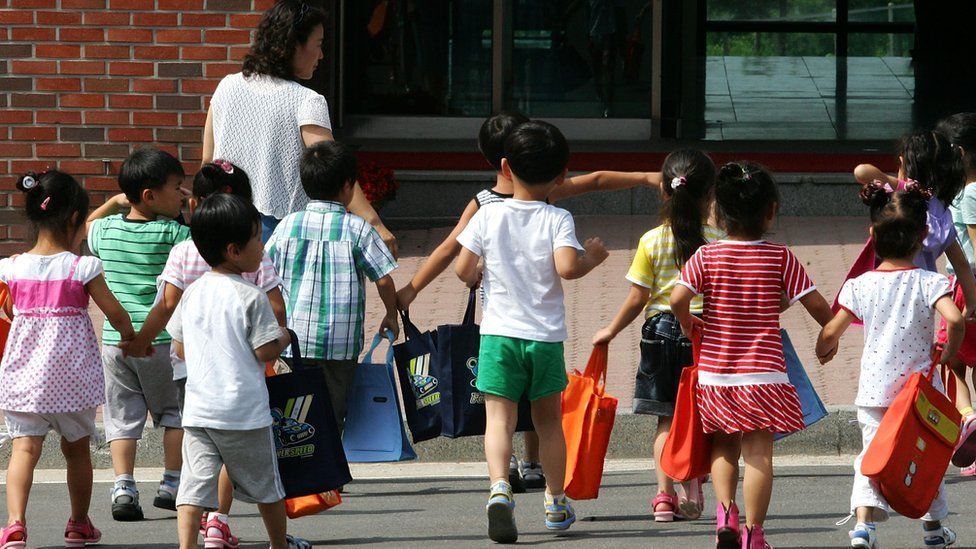
-
City Hall tackles homeless hub

The Bangkok Metropolitan Administration (BMA) is to limit drop-in facilities for homeless people living on Ratchadamnoen Avenue to tidy up the area.
According to Bangkok governor Chadchart Sittipunt, a Ministry of Social Development and Human Security report showed that the situation for homeless people had improved, with the number expected to decrease from 1,600 to 1,400 this year.
However, Mr Chadchart said that the situation on Ratchadamnoen Avenue is still concerning, especially after photos of homeless people living in front of the abandoned buildings on Ratchadamnoen Klang Avenue near Satriwithaya School went viral recently.
Mr Chadchart said that the spot drew the homeless as it is known that some people visit at night to offer food and cash.
“One of the main solutions is to limit the drop-in locations to one under the Phra Pinklao Bridge and the another in Sake Alley on Assadang Road,” he said, saying that this aims to not only tidy up Ratchadamnoen Road but also streamline registration procedures for the homeless in the future.
City Hall has also been attempting to make work available, and according to Mr Chadchart, 169 job positions have so far been offered to the homeless.
The BMA also plans to change the location of the Baan Imjai shelter to Chaloem Wan Chat Bridge after the rental contract on a former building in Soi Mansri is over, said Mr Chadchart, adding that a refurbishment will be finished this year.
Meanwhile, according to Weeraphan Suphanchaimat, chairman of the Thai Health Organisation’s (ThaiHealth) Directing Committee on Health Promotion for the Homeless, 500–600 of the 1,217 homeless people in Bangkok live in Phra Nakhon district and Ratchadamnoen Avenue.
This information led ThaiHealth and related sectors to establish a drop-in spot located under Phra Pinklao Bridge, which provides everything from job positions and healthcare support to basic hygiene facilities, such as a laundromat and shower room, for homeless and vulnerable people, said Dr Weeraphan.
According to Thapanee Sirisombun, director of the Bangkok Homeless Protection Centre, the age range of newly homeless people who registered with the drop-in spot ranged from 40 to 60 years old.
Extortion after German disappears

CHON BURI: Police suspect extortion was the motive in the disappearance of a wealthy German businessman in Pattaya last week.
They have identified a woman believed to have pointed him out to his abductors, and the recipient of money paid by the missing property broker, 62-year-old Hans Peter Ralter Mack, Pol Gen Surachate Hakparn, deputy police chief, said yesterday.
He said police would find Mr Mack, whether he was alive or dead.
Investigators were compiling their case to apply for court warrants, and he expected an arrest in the near future.
“The case concerns assets. The offenders seemed to know that Mr Mack had assets. Detectives must find out if they knew Mr Mack personally,” the deputy national police chief said.
Police would also look into the business activities of other people in the case, he said.
Regarding the investigation, two suspects, one Thai national, who is said to have identified the victim, and the other, a foreigner identified as Olaf, were called in for questioning at Nong Prue police station on Sunday night, said Pol Gen Surachate.
The two suspects, accompanied by their lawyers, declined to give statements.
Pol Gen Surachate said that the police believed Mr Mack’s property might be the main motive, as some transfers were seen into Mr Olaf’s bank account while Mr Mack was still missing.
Sources said investigators had detected suspicious financial transactions totalling about 2 million baht, which might be linked to the man’s disappearance.
He also said that the disappearance seemed well planned, adding that a forensic investigation regarding a chemical cleanser used to wipe the interior surfaces of Mr Mack’s Mercedes-Benz is needed.
Earlier in the morning, Mr Mack’s family, accompanied by representatives of the Win-Win Foundation, met with Pol Gen Surachate and representatives of the German embassy in Thailand to discuss the case.
Meanwhile, in Chon Buri, Pol Col Tawee Kudthalaeng, Nong Prue police chief, said that the police had also invited Mr Mack’s family members for more questioning on Sunday night.
Mr Mack, 62, has not been seen since July 4 after leaving home to meet a foreign property broker he had recently met.
The family filed a missing person complaint with police on July 5 and later offered a reward of 3 million baht for information on Mr Mack’s whereabouts.
SoftBank is at the center of yearlong Nikkei rally
TOKYO – It’s no surprise, perhaps, that SoftBank Group’s 22% stock rally these last 12 months exactly mirrors that of the broader Nikkei 225 index.
Few Japanese conglomerates have benefited more from the Nikkei rally – or from the Bank of Japan’s ultra-loose policies – than the one that Masayoshi Son built.
Case in point: SoftBank’s telecom unit just pulled off one of the biggest yen bond sales in recent memory thanks to wide-scale market expectations that the BOJ will keep its foot on the monetary gas.
SoftBank‘s feat in raising US$840 million managed to lift confidence in credit markets that big debt issuance deals were back. It more than confirmed promising hints from earlier sales by Mitsui Fudosan Co and Kubota Corp. It was even better that the SoftBank sale was supersized from an initially planned US$350 million amid demand that was more than twice what SoftBank anticipated.
Yet as much as SoftBank is benefiting from the Nikkei rally and the BOJ’s largess, it remains unclear if one of Japan’s three richest men is ready to return the favor.
The reason Son is a subject of global intrigue is the US$100 billion SoftBank Vision Fund he created in 2017. It has since remade the global venture capital game, with Son adding the financial firepower of a Vision Fund 2. Very quickly, a meeting with Son’s team became the top aspiration for young entrepreneurs from Silicon Valley to Hyderabad to Seoul.
Son’s VC ambitions were always a way to tap growth outside aging Japan. Japan’s deflation, dismal demographics and a play-it-safe corporate culture had Son deploying billions and billions in China, India, South Korea, Indonesia, Bangladesh, Brazil, Kenya, Israel and elsewhere.
The plan was to ride a herd of tech “unicorns” around the globe to riches SoftBank could no longer find at home in Japan.
At the core of Son’s vision, of course, was recreating the magic he achieved with China’s Alibaba Group 23 years ago, around the same time the BOJ pioneered quantitative easing.
In 2000, Son had the remarkable foresight to hand US$20 million to an obscure English teacher in Hangzhou. By the time Jack Ma took Alibaba public in New York in 2014, SoftBank’s stake was worth more than $50 billion.

The feat earned Son a reputation as the Warren Buffett of Japan. The launch of his Vision Fund was an attempt to replicate that success over and over again.
Yet Son has found that to be easier said than done. Among the big swings that Son missed: a perplexing fascination with WeWork, which over time became the Vision Fund’s cornerstone investment. Son bought into founder Adam Neumann’s claims to be creating the next Apple Inc with his office-sharing empire.
By 2019, as WeWork looked more like a financial house of cards and epic losses mounted, Son admitted “really bad” judgment in having championed the company as the next big thing. As Son scrambled to stabilize the Vision Fund, sandbagging efforts included selling roughly $7.2 billion worth of Alibaba. Son’s team is also working on an initial public offering of Arm Ltd, SoftBank’s chip unit.
Might Son now pivot to investing big in Japanese startups as opposed to prospective Chinese unicorns?
A few big data points have changed some Asia-region calculus since Son’s WeWork debacle:
- slowing Chinese growth following leader Xi Jinping’s crackdown on mainland tech;
- a deepening Sino-US trade war aimed particularly at tech goods; and
- a Nikkei rally that has top global investors like Buffett rediscovering Japan.
In recent days, US Treasury Secretary Janet Yellen and Chinese Premier Li Qiang tried their hand at rebooting the Sino-American relationship. But with US President Joe Biden’s team determined to limit Chinese access to key technology like semiconductors — and Xi curbing exports or rare earth materials — tensions appear to be going from bad to worse.
This has Team Son rethinking its aversion to putting big money to work in Japan. Here, Buffett’s own bets on Japan’s economy may come into play.
In May 2022, Prime Minister Fumio Kishida took his campaign to lure more foreign capital to London, where he implored businesspeople to “invest in Kishida.” It was a play on a plea that Kishida’s mentor had made in New York nine years earlier.
In September 2013, then-Prime Minister Shinzo Abe brought his “buy my Abenomics” tour to the floor of the New York Stock Exchange. Abe pledged to reduce bureaucracy, loosen labor markets, incentivize innovation, boost productivity, empower women and reclaim Tokyo’s place as Asia’s undisputed financial center.
Mostly, though, Abe relied on BOJ easing to juice Japanese gross domestic product via a weaker yen. That, and some modest tweaks to corporate governance had Buffett and his ilk kicking Japan’s tires.
The so-called “Buffett effect” first hit Japan in August 2020. The Oracle of Omaha surprised many in the Tokyo establishment with sizable investments in five old-economy companies. Buffett took 5% stakes in rather stodgy “sogo shosha” trading houses: Itochu, Marubeni, Mitsubishi, Mitsui and Sumitomo.
The bets paid off handsomely. Last month, around the time Buffett topped up those investments — to an average 8.5% — shares had roughly doubled among his initial five investments. Buffett, true to his value-investing-guru reputation, front-ran the Nikkei’s biggest rally in 30 years.
The question now is how Son responds. Part of it involves how Kishida plays things.

Kishida took power in October 2021 with grand plans to implement a “new capitalism.” Part of the scheme involved redistributing wealth to increase domestic consumption. Kishida also aimed to enliven Japan’s startup scene.
One early Kishida idea that holds great promise: devising a way to harness the $1.6 trillion Government Pension Investment Fund – the largest of its sort – to finance a startup boom. There, Kishida talked of facilitating the “circulation” of GPIF’s ginormous asset pool “into venture investment.” He talked of championing “stock options and other measures to promote the growth of start-ups.”
According to Ranil Salgado, an economist at the International Monetary Fund, there’s a need for a “holistic approach to address the constraints in the labor market, as well as improving the financing options and entrepreneurial education.”
Salgado adds that the “grand design of the new form of capitalism” includes measures to support venture capital, such as through public capital investment. In addition, it recognizes the constraint of personal guarantees on entrepreneurship, highlights the importance of entrepreneurial education, and strengthens the role of universities as startup hubs.”
Increased availability of venture capital equity funding, Salgado says, “is crucial to support startups and innovation. Reduced personal guarantees could help encourage entrepreneurship and allow unproductive firms to exit, which could in turn support investment and innovation, generate employment and improve productivity.
“Furthermore,” he says, “a more flexible labor market and a gradual shift from the lifetime employment system could encourage the most talented college graduates to venture and create new companies and have a reasonable backup option in case startups fail.”
Yet how SoftBank responds to these challenges and myriad others may decide how Asia’s number two economy fares in competition with the continental colossus that’s number one.
China raises five demands during Yellenâs visit
The Chinese government has made five demands on the United States, including the cancellation of its chip exports ban and sanctions, during US Treasury Secretary Janet Yellen’s four-day China trip ended Sunday.
China’s Ministry of Finance said in a statement on Monday that it has expressed concerns to Yellen about the extra tariffs, company sanctions, investment restrictions, export controls and Xinjiang product bans imposed by the US on China in recent years. It said the US should take concrete actions to respond to China’s concerns.
Chinese commentators said the China side arranged meetings between key economic officials and Yellen, showing that Beijing attaches great importance to her visit. They said Washington knows clearly what to do if it wants China to purchase its treasury bonds.
During her four-day trip ended Sunday, Yellen met with Premier Li Qiang, Vice Premier He Lifeng, Finance Minister Liu Kun and People’s Bank of China (PBoC)’s party secretary Pan Gongsheng, as well as former Vice Premier Liu He and PBoC governor Zhou Xiaochuan. She had a total of about 10 hours of discussions with them.
“China’s development is an opportunity, not a challenge, for the US. It is a gain, not a risk,” Deputy Chinese Finance Minister Liao Min said in a statement published on Monday. “Strengthening cooperation between China and the United States is the practical need and the correct choice of the two countries.”
“To achieve a healthy Sino-US economic relationship, we must fully respect the legitimate development rights and interests of all parties, and conduct healthy competition in accordance with market economic principles and World Trade Organization rules,” he said. “Differences should not be a reason for estrangement, but rather a driving force for strengthening communication and exchange.”
He said China and the US should seek consensus on important issues in the bilateral economic field through candid exchanges, so as to inject stability and positive energy into their economic relationship. He said that during Yellen’s trip, China had shown its willingness to help resolve global challenges, such as financial stability, climate change and smaller countries’ debt problems.
Technology curbs
Last month, media reports said Washington will soon announce its plan to ban Nvidia from shipping its A800 and H800 artificial intelligence chips to China, and also restrict US funds from investing in China’s high-technology sectors later this month.
Yellen told the media on Saturday that Washington will listen to China’s complaints about security-related curbs on US technology exports. She said the Biden administration will try to avoid unnecessary repercussions but she did not indicate any possible changes.
“We will open up channels so that they can express concerns about our actions, and we can explain and possibly in some situations respond to unintended consequences of our actions,” she said.
She said she had tried to explain to Chinese officials that the United States’s strategy of “de-risking” is not the same as “de-coupling.” She described her conversations with top Chinese officials as “direct, substantive and productive.”
“Even where we don’t see eye-to-eye, I believe there is clear value in the frank and in-depth discussions we had on the opportunities and challenges in our relationship, and the better understanding it gave us of each country’s actions and intentions,” she said. “Broadly speaking, I believe that my bilateral meetings – which totaled about 10 hours over two days – served as a step forward in our effort to put the US-China relationship on super footing.”
Yellen did not announce any agreements on major disputes with Chinese officials. She said both sides will have more frequent and regular communication.
Three bows
Ahead of Yellen’s visit to Beijing, Chinese commentators had said that the former Fed chairman was coming to China to sell US treasury bonds.
This view came after US President Joe Biden and top Republican lawmaker Kevin McCarthy reached a tentative deal to raise the federal government’s US$31.4 trillion debt ceiling in May. The decision will be followed by the issuance of nearly $1.1 trillion in new treasury bills over the next seven months.

When Yellen met top Chinese economic official He Lifeng on Saturday, she was seen bowing three times to him while they were shaking hands. She was criticized by some US lawmakers and academics for showing weakness with such a diplomatic gesture. Yellen’s official Treasury Department biography doesn’t mention any previous Asia forays in which she might have boned up on relevant protocol.
Chinese netizens turned the footage of her bows into an animated GIF picture, making her bow repeatedly.
On Monday, Tian Liu, a Hubei-based columnist published an article with the title “If Yellen wants China to buy US debt, she must complete China’s tasks. Three bows are not enough.”
“From our or Yellen’s official statements, it is not difficult to see that the two sides mainly ‘exchanged views’ this time, and neither side got what they wanted. The US did not agree to lift the sanctions, and China did not agree to buy US debt,” the article says.
“Finding buyers for US debt is the top mission of Yellen. From a medium-and-long-term perspective, China is disposing of US debt,” it says. “Who else will buy it? Japan is the biggest creditor of the US but cannot buy more. The United Kingdom is facing an economic recession and sold $30 billion of US debt in April.”
“It is only the US side’s wishful thinking that the US can sell its debt to China, or set guardrails for the Sino-US relations, without giving what China wants,” Liu’s article says.
“Yellen’s bows will not be able to change anything. If the US does not satisfy China’s five demands, we will not respond to its call of buying US debt,” the article continues.
“It is possible that the US may not consider any of our demands and use all possible means to contain and suppress our country,” it says. “If the US does not show some sincerity, the Sino-US relations will not improve.”
However, some other analysts have said that whether China will invest in US debt depends on its trade surplus situation, not its relations with the US.
No immediate war
Chinese media and commentators have so far made positive comments about Yellen’s trip.
Caixin said in its editorial on Monday that people should look at the competition and cooperation between the US and China rationally.
It said China is not afraid of competition but opposes malicious confrontation. It said both China and the US can set areas and boundaries for competition and should avoid “de-coupling.” Another pundit also surnamed Liu says in his vlog that Yellen’s visit to China is important as it shows that China and the US are still having dialogues and will not have an immediate war.
“Yellen is obviously the dovish among all top US officials. If we do not want to talk to her or we fail to achieve anything, it will send a pessimistic signal to the whole world,” Liu says.
“China and the US almost had a hot war, but still both sides have some hopes on each other in the economic areas,” he says. “China hopes that the US can ease its blockages and sanctions and lower some tariffs. Although the chance is slim, Chinese leaders have not given up as these are what we urgently need now.”
He says the US wants China to buy US debt, completely open up its markets and stop investing in high technology but Beijing will only consider the first request.
Read: Cordial tone in Yellen’s Beijing visit
Follow Jeff Pao on Twitter at @jeffpao3
Footage shows moment of Bangkok highway collapse
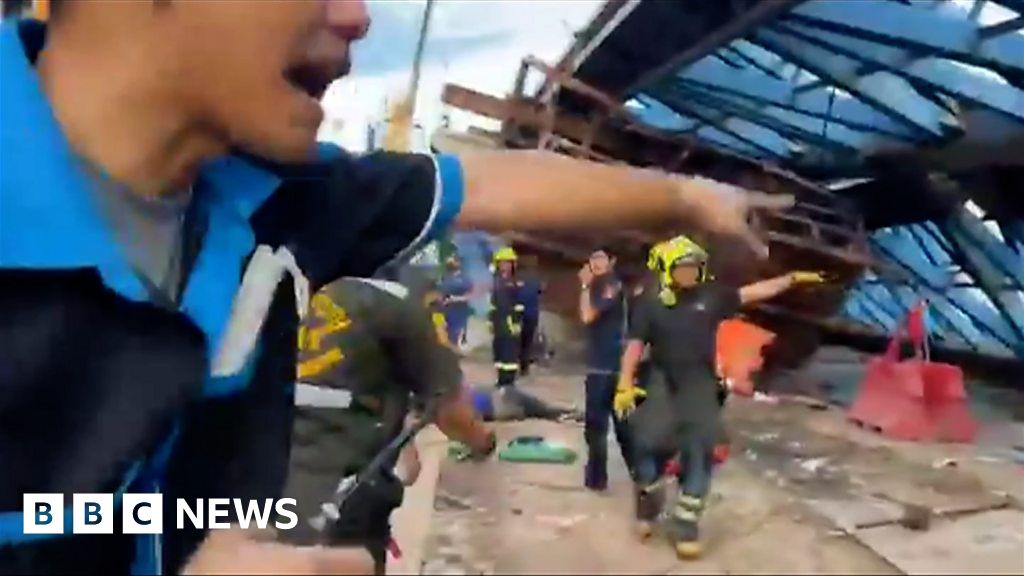
A huge metal construction girder has fallen onto a busy road in Bangkok, killing at least one person and critically injuring several more.
Rescue workers rushed to the scene to search for survivors from crushed cars and damaged buildings.
The girder was part of a project to build elevated highways in the city.
Bangkok’s Governor Chadchart Sittipunt said the cause of the accident is not yet known.
Japan: Toshodaiji Kondo temple in Nara defaced by Canadian teen
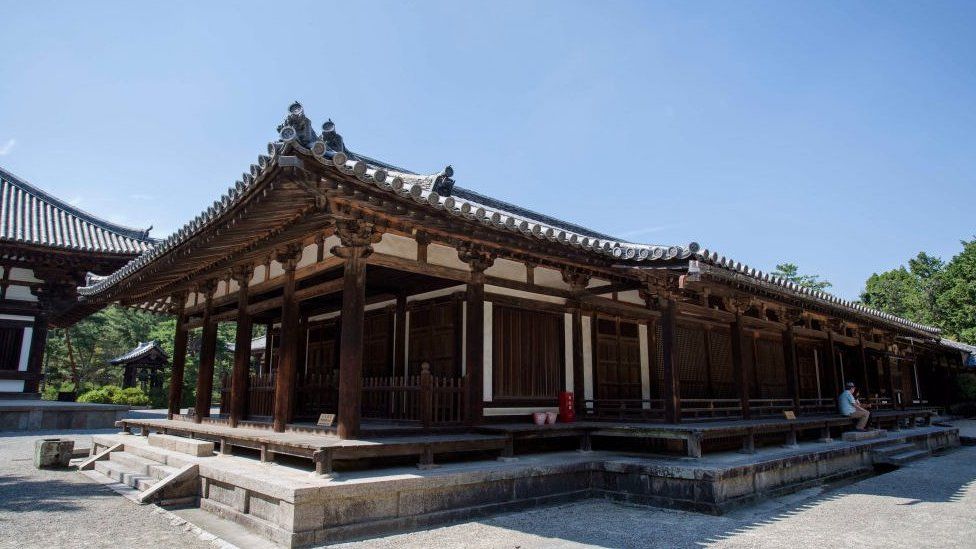 Getty Images
Getty ImagesA Canadian teenager has been questioned by police in Japan after carving letters on a wooden pillar of an 8th Century temple.
Police said the 17-year-old boy carved “Julian” on a pillar at the Toshodaiji Kondo temple complex in Nara, Japan.
The boy was caught carving the pillar with his fingernail by a Japanese tourist, who alerted temple staff.
The temple is a designated UNESCO World Heritage Site.
After the incident, which occurred on 7 July, the boy was questioned on suspicion of violating the cultural properties protection law.
The carving was made on the pillar of the temple’s “Golden Hall”, which is a designated national treasure, police told Japanese newspaper The Mainichi.
Police also told CNN that the boy said his actions did not intend to harm Japanese culture. They added he is now with his parents, who were with him when the vandalism occurred.
A monk at the temple told The Mainichi that “even though it may have been done without malice, it is still regrettable and sad”.
The temple is one of eight sites that make up the Historic Monuments of Ancient Nara.
According to UNESCO’s website, the monuments, which include Buddhist temples and Shinto shrines, “provide a vivid picture of life in the Japanese capital in the eighth century, a period of profound political and cultural change”.
Nara is around 45km (28 miles) south of Kyoto, and was once the capital of Japan. It remains popular with tourists.
Under Japanese law, any person who has damaged an object of “important cultural property” could face up to five years in prison, or a fine of ¥300,000 ($2,120; £1,650).
The incident in Nara follows a video which showed a UK-based man carving a message into a wall at Rome’s ancient Colosseum.
The man, Ivan Dimitrov, faces legal proceedings after cutting “Ivan+Haley 23” into stone at the 2,000-year-old monument. He has apologised and said that was not aware how old the monument was when he acted.
-
-
24 November 2014

-
At least one dead after under-construction Bangkok highway collapses
BANGKOK: At least one person has died after a huge construction girder over a busy road collapsed in the Thai capital Bangkok, police said Monday (Jul 10), with videos of the terrifying incident rapidly shared online. The massive metal girder on the Lat Krabang Tollway construction project to the eastContinue Reading
Kroll: Lack of communication weakens cyber resilience, say 52% of Singapore’s senior security decision makers
95% of security decision-makers lack senior leadership trust in protecting firms
Only 20% of security professionals with cyber-mature security ops have cyber insurance
Kroll, the leading independent provider of global risk and financial advisory solutions, announced the release of its report State of Cyber Defense 2023: The False-Positive of Trust.
In a statement the…Continue Reading

